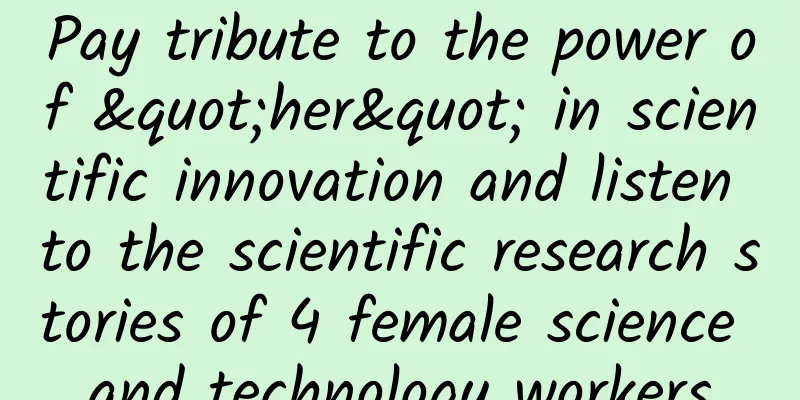Pay tribute to the power of "her" in scientific innovation and listen to the scientific research stories of 4 female science and technology workers

|
On International Women's Day, we have selected several previous winners of the "China Young Women Scientists Award" and, through their scientific research stories, pay tribute to the female scientific and technological power that will create the future. ▲Cover of Beijing Science and Technology News, March 7, 2022 Liu Ying: Don’t set limits on life. The boundaries of the world are our boundaries. Liu Ying Vice Dean of the School of Future Technologies, Peking University Professor, Institute of Molecular Medicine, Peking University Winners of the 15th "China Young Women Scientists Award" Liu Ying, who explores the essence of life in the microscopic world at the molecular level, has frequently appeared in international academic journals such as Nature, Nature Cell Biology, eLife and Cell Research, and became a doctoral supervisor at Peking University at the age of 29. She has won many honors and is the vice dean of the Peking University School of Future Technology and professor of the Institute of Molecular Medicine of Peking University. If you get to know her "high-efficiency life", you will find that the concept of "curiosity about life phenomena" runs through her entire scientific research and life. "When we encounter pedestrians while driving, we will consciously slow down and avoid them; when we hear the alarm clock in the morning, we know it's time to get up; when we feel the weather getting warmer, people start to take off their cotton clothes and put on spring clothes...Humans rely on vision, hearing, touch and other senses to receive information and adjust themselves to the environment. So what about cells as the basic structure and functional unit of living organisms?" Liu Ying is engaged in research related to cell stress and homeostasis regulation. To put it simply, it is how cells perceive information and respond. She introduced that in order to maintain normal growth and survival, cells, like humans, must correctly assess the state of their environment and ensure that they can adapt to the stressful environment through a series of stress mechanisms. Abnormal responses to stressful environments and dysregulation of cell homeostasis will lead to abnormal cell function or even cell death, ultimately causing cancer and aging-related diseases. This topic is closely related to some common metabolic diseases, aging-related diseases and cancer, and has very important application prospects. Liu Ying explained, "So my job is actually to explore the mysteries of life." "I have been curious about nature and life since I was a child. For example, why do leaves turn yellow and fall off, how do ants move, how do they find food, call their companions, how do they divide food, and then line up to carry the food back home. This curiosity has not been wiped out by the exam-oriented education since I was a child, and it is considered the most critical thing for doing scientific research later." To this day, Liu Ying still clearly remembers the biology experiment class in high school that sparked her strong interest in science. She mashed the banana and extracted the DNA in a few simple steps. "When I saw the fiber-like threads of DNA appear in the glass test tube, that moment was particularly sacred in my heart. I actually saw DNA carrying genetic information! It was at that moment that I formed an indissoluble bond with life sciences." Talking about her research, Liu Ying believes that she is very lucky. The research of life sciences has brought her a lot of fun and self-realization. "When I am engaged in scientific research, I often feel that I am in an independent little world, and I am the free king of this spiritual world. Scientific research is a place where I can settle down spiritually. Modern society is running at a high speed and high pressure. Many people in middle age will suddenly sigh one day, wondering how they have become what they are now. The standards of society and the eyes of the public are indeed difficult to ignore, but I hope you can have a scale in your heart and learn to make choices for the life you want." Liu Ying said frankly. The spirit of educating people is related to the long-term development of science and technology. Science is a great cause that connects the past and the future and constantly surpasses others. It is a process of mutual learning and growth between predecessors who are willing to serve as stepping stones and younger generations who are constantly surpassing others. It is precisely because Liu Ying realizes the importance of curiosity to scientific research that, in addition to teaching and scientific research, Liu Ying is also keen on popular science education and spreading curiosity to young people. Liu Ying has participated in the recording of a series of elementary school life science classes and experimental classes in life. This series of videos is still often played today. Liu Ying occasionally receives letters from parents, sharing their children's enthusiasm for learning with her and asking some scientific questions. This feeling of being recognized encourages her. "Doing popular science means that you may plant a seed of science in the heart of a child without even knowing it. Maybe one day it will sprout, bloom, and bear fruit." In Liu Ying's view, efficient scientific research and high-quality life are the right way to open up life. Liu Ying's most common expectation for students is, "Believe in yourself, don't set limits on your life, believe in the power of belief, and dare to try any possibility. The boundaries of the world are our boundaries." (Written by reporter Lv Bingxin) Lü Zhi: Observer and bridger between mountains and waters Lü Zhi Professor, School of Life Sciences, Peking University Founder of Shanshui Nature Conservation Center Vice President of China Association of Women Scientists and Technologists Winners of the 2nd China Young Women Scientist Award "How can we, who come from the mountains and rivers, live harmoniously among them?" This is the question that Lü Zhi, a professor of conservation biology at Peking University, has been thinking about all her life. As a leader in biodiversity conservation in my country, Lü Zhi has many prestigious titles, but she sees herself as just an observer and bridge-builder between mountains and rivers. The forest after snow is always very quiet. A figure walks cautiously on the path in the forest, afraid that the "squeaking" sound of stepping on the snow will disturb the solemnity. There are footprints on the snow from time to time, and the panda's feces "left" in the grass. Even the sign that says "Protect Wildlife" still has the curious teeth marks of the giant panda... This is the first "business card" that nature handed to Lv Zhi during her first field survey. This memory, along with her excitement about the wild, is deeply imprinted in her memory. Since she came to study at the Department of Biology of Peking University in 1981, Lv Zhi has had an indissoluble bond with nature. In her junior year, she was determined to study giant pandas, and going deep into the mountains and forests became commonplace. From following from a distance at first to building mutual trust later, Lv Zhi's story with pandas has both thrilling encounters and touching moments. However, such a beautiful encounter did not last long - with the expansion of cities and the development of industry, the mountains and forests are becoming fewer and fewer, and the land is becoming more and more bald. Seeing the habitats on which wild pandas depend for survival shrinking sharply, Lv Zhi suddenly realized that protecting the natural ecology has long become an urgent need. However, the protection process was not as smooth as she imagined: under the leadership of teacher Pan Wenshi, Lv Zhi and her classmates worked hard to save the forest, but the local loggers lost their jobs, and the friends who used to take care of each other became strangers. Some people even wrote slogans saying "Scientific research is prohibited here." For a while, her mood dropped to the bottom - she knew very well that the locals did not want to ban scientific research, but those who lost their "jobs" for the sake of nature. This experience was like a thorn that pierced deeply into Lv Zhi's heart, and it also forced her to start thinking about a question: How can we balance the relationship between man and nature while protecting the natural ecology? With this question, she participated in the establishment of an NGO organization in the following decades, uniting local and social resources. While carrying out species monitoring, she also promoted the training of local residents, such as actively guiding residents of protected areas to participate in forest protection, encouraging local people to develop eco-friendly industries such as beekeeping and tea planting, and providing nature observation services for animal lovers... People no longer have to "live off the land" like they did decades ago, and they have also put down their resistance to "nature protection" and "scientific research." In Lv Zhi's view, the important issue that cannot be avoided in natural ecological protection is how to solve the problem of "why do local people do nature protection" and how to make the needs of local people and nature protection a smooth rather than confrontational relationship. "Nature protection is not just shouting slogans, but reality tells us where the problem lies." She said, "In addition to protecting animals and nature, this protection also involves how we view and solve the lives of those who live in it. Therefore, all the conservation work I did later was related to people." In the process of repairing the relationship between man and nature, Lv Zhi feels that nature is also subtly shaping a new self. "Nature has given me tremendous energy - I have seen the most beautiful places and the most magnificent scenes in the world. These experiences have invisibly shaped my spiritual world and also given me a firm heart and confidence to do my best for nature," she said. In Lu Zhi's eyes, gender has never been a shackle. Although field surveys may seem unfriendly to women to outsiders, for those who actually participate in them, there are no gender barriers at all. They can do whatever they want, and there is no question of whether it is suitable for women or not. "In fact, here we have girls studying wolves, tigers and leopards, while boys study small animals and plants." She said half-jokingly, her eyes full of determination and calmness, "But this does not mean that there is no prejudice against female scientists in society. For example, there are always people who think that girls are not suitable for our field. But on the contrary, I think girls are suitable for field work - the difference in physical strength can be improved through exercise, and there are even gender advantages in observing animals and plants." Except for the fact that people around her talked about gender when she chose to work in the field, her female identity has not become a shackle for her to strive for her ideals in her decades of scientific research. It was not until she won the "China Young Female Scientist Award" in 2005 that Lv Zhi began to re-examine the impact of the word "female" on her. "I realized that I am lucky, but there are many people in the world who are not lucky." She said, "As a member of the female group, I want to analyze what I have obtained, which ones are available to women and are universal, and which ones we need to fight for extra." Since then, Lv Zhi has actively participated in various public welfare activities, actively speaking out for female scientific researchers, and striving to create a better development environment for them. As the vice president of the China Association of Women Scientists and Technologists and a mentor to many female doctors, Lv Zhi found that although many female scientific researchers have outstanding work abilities, they still cannot avoid the impact of childbirth on their careers. To this end, Lv Zhi actively encourages the independence of female students, and the Association of Women Scientists and Technologists has promoted the introduction of relevant policies, delaying the age of young scientists' fund selection by 5 years, providing female scientists with more time to balance family and work needs, and creating a more friendly and benign development environment for them. "In addition to the support of the general environment and the elimination of inherent stereotypes in society and culture, the efforts of each individual are equally important in breaking gender bias. Women must respect themselves first." Lu Zhi said, "Women must have the right understanding and attitude, have an independent personality, and build strong self-confidence from the heart, and use practical actions to tell everyone your value." (Written by reporter Wang Xueying) Wang Linghua: Science has nothing to do with gender or age, it only has to do with interest Wang Linghua Researcher, School of Earth and Space Sciences, Peking University Winners of the 12th "China Young Women Scientists Award" Can the wormhole in "Interstellar" really travel through time and space? Can the plot of "The Wandering Earth" that ignites Jupiter's atmosphere allow the Earth to escape Jupiter's gravitational control? Are the intelligent spies that intimidate the Earthlings in "The Three-Body Problem" actually feasible in theory? ... As a professor at the School of Earth and Space Sciences of Peking University, Wang Linghua always unconsciously thinks about the scientific nature of science fiction works when watching them. In addition to the viewing experience of ordinary people, the core of these works that emphasizes the courage to imagine and explore the unknown world often gives her another level of satisfaction: this coincides with her characteristics of pursuing truth in scientific research and being curious about the world. Wang Linghua's scientific research experience is very simple, and the only thing that sticks with her is interest. She has always had very good grades in mathematics, physics and chemistry, so she naturally chose science. In 1995, when she was admitted to the Department of Geophysics at Peking University, she first heard of the subject of space physics, which is a discipline that uses space vehicles to directly detect and study physical phenomena and processes in space. "Simply put, the areas that artificial satellites can reach now belong to space physics, and the areas that artificial satellites cannot reach now belong to astronomy." Hearing the teacher say this, Wang Linghua, who has always been interested in space knowledge, was moved, so she chose the space physics major that most people think is very "cold". Guided by her interests, she chose the most challenging and most attractive direction in her graduate studies - high-energy particles in the sun and heliosphere, and deciphered more cosmic information through the study of high-energy particles. In fact, high-energy particles are ubiquitous in the universe, and their speed is much higher than our daily cognition, which may be many times higher than the speed of a jet plane, or even close to the speed of light. At present, much of human understanding of the universe comes from these high-energy particles. Wang Linghua introduced that high-energy particles not only act in space, but are also closely related to ordinary people. Nowadays, satellite-related needs in people's lives, such as real-time navigation and rapid positioning, may be affected by high-energy particles. If humans can conduct interstellar navigation in the future, then related research on high-energy particles will provide a strong guarantee for new space activities. So, what is the heliosphere? The sun continuously blows out solar wind, and the interaction between the solar wind and the interstellar medium blows out a huge cavity structure in the entire universe, which is the heliosphere. Wang Linghua said: "The sun and the heliosphere provide us with a huge natural scientific laboratory to study the physical processes occurring in space." Usually, Wang Linghua's job is to use satellite observation data to study the origin, acceleration and propagation of high-energy particles in the heliosphere, as well as the physical nature of the process, and to develop high-energy particle detectors. Occasionally, when the observed data cannot be understood temporarily, she is not frustrated, but starts to analyze with full enthusiasm. She never thinks that this will be an obstacle in the scientific research process, but regards them as a driving force, thinking that this "may lead to new scientific research directions." With solid research, she discovered that in the quiet period of the heliosphere, there is an unknown high-energy particle component - the outer halo electron. This discovery has updated people's understanding of high-energy particles in space. Since solar eruptions will eject a large amount of plasma into interplanetary space, if this plasma propagates toward the earth, it will squeeze the earth's magnetosphere after reaching the earth, causing magnetic storms. Wang Linghua's research will help humans deal with possible catastrophic space weather events. Unlike many other physics disciplines, the progress of space physics depends on space exploration. "In other words, whoever masters the ability to develop advanced space probes controls the direction of the discipline's development." Wang Linghua said that the ability to develop space probes is a bottleneck in the development of space physics in my country. Recently, she and her team applied for a major national instrument development project, mainly for the exploration of high-energy particles in interstellar space, hoping to help break through this bottleneck. As a female scientist, Wang Linghua is naturally concerned about the current situation of female students engaged in scientific research. She found that many female students have excellent basic knowledge and thinking ability, but because they have been subtly influenced by the long-term remarks such as "women are not suitable for studying science" and "women are not suitable for scientific research", they are inevitably not confident and hesitate when making scientific research conclusions. "This is a very unfortunate situation. Because two of the four milestone events in the history of space physics: the discovery of the Earth's radiation belt, the first field observation of the solar wind, the discovery of the Europa underground ocean, and the discovery of solar microflares, were discovered by women. Science has nothing to do with gender and age, only interest, and both men and women can make important contributions." As for scientific research itself, Wang Linghua suggested that if you are really interested in a certain field, you must stick to your choice. "The long road of scientific research is like life, it will never be smooth sailing. In the process of moving forward, you will definitely encounter many difficulties, but don't give up, keep moving forward, and you will definitely get positive feedback and feel great happiness." (Written by reporter Zhao Ling) Tao Xiaoming: The seeds of science bloom into the roses of time Tao Xiaoming Professor of Electronic Engineering, Tsinghua University Winners of the 14th "China Young Women Scientists Award" We are in an era of information explosion. Communication technology is changing with each passing day, but it still cannot meet people's needs. "The future direction of communication technology has turned to broadband and multimedia, but communication spectrum resources are facing an increasing shortage," said Tao Xiaoming. Under the new severe situation, how to meet people's communication needs for higher capacity and higher bandwidth has become a difficult international problem. Tao Xiaoming, a professor at the Department of Electronic Engineering at Tsinghua University, and her team are committed to finding a key that can solve the problem - introducing intelligent computing into traditional communication technologies and expanding bandwidth requirements through basic research - opening up more possibilities for the wireless world for you and me. Traditional wireless communication technology is based on data communication, including multimedia information such as text, images, and sound. Each time a transmission is realized, a new communication connection must be established. If each transmission of wireless communication is regarded as a "meeting", then in traditional communication technology, "both parties" must "introduce themselves" again every time they meet, which also occupies the already scarce bandwidth resources. In this regard, the traditional method to solve the bandwidth problem in the communication field is to compress and encode multimedia information to achieve the purpose of improving transmission efficiency. However, due to the rate-distortion performance, once the multimedia information reaches the critical point of distortion, it is difficult to compress it. Faced with the constraints of traditional methods, Tao Xiaoming took a different approach and chose a bold and imaginative new idea: introducing artificial intelligence technology into the field of wireless communication. "The core innovation of intelligent collaborative computing in video communication is to integrate intelligent computing into traditional communications. Through calculation, the unknown information that really needs to be transmitted is found out, and the known information is pre-stored at the sending and receiving ends, so as to avoid repeated transmission, thus effectively achieving the purpose of saving communication transmission bandwidth." Tao Xiaoming explained, "It's like strangers 'first time is strange, second time is familiar'." Model-based intelligent computing "introduces the two parties to each other" at the first connection, so there is no need to "re-introduce" and occupy bandwidth for the next transmission. Tao Xiaoming first proposed this innovative research direction more than ten years ago, when the domestic mobile communication network was transitioning from 2G to 3G. As an emerging interdisciplinary subject, wireless multimedia communication is by no means a simple superposition of the two fields of "wireless communication" and "multimedia processing." Although machine learning was developing rapidly at the time, the idea of using computational communication as a new method to achieve face-to-face real-time communication was still considered difficult to achieve internationally. Tao Xiaoming's team's papers were repeatedly rejected. "Most of the reviewers believed that the research ideas of the papers were different from traditional methods," she recalled. In the next two or three years, this research direction seemed to have reached a dead end. "Doing cutting-edge technology research is often like walking in a no-man's land, with no clear path ahead and no idea where the end is." Tao Xiaoming did not give up easily during the days of great pressure. After several years of hard work and countless experiments, good news finally came: experiments proved that with the support of new computational communication theory, the effect of video communication saves several times the bandwidth compared with traditional methods. Since then, the team has continuously published high-level papers and has been highly recognized by international peers. Recalling his self-motivation on the road of scientific research, Tao Xiaoming said with a smile that in addition to the charm and fun of scientific research itself, there is also the "original intention" planted by the science fiction movie "The Matrix". In 1999, 18-year-old Tao Xiaoming was a freshman at the School of Communication Engineering of Xidian University. At that time, the Internet in China had just emerged, and even blue-screen mobile phones had not yet appeared. The cool scenes in the movie "The Matrix" shocked Tao Xiaoming: in this world with unlimited bandwidth, all contacts between the protagonist Neo and the mother body Matrix can be transmitted at any time through wireless communication. At that time, Tao Xiaoming had only one thought in his mind: Can future technology develop like this? It would be great if I could realize such a future with my own hands. Today, 23 years later, the seed she planted has finally blossomed into the rose of time. (Compiled by Ji Jingjing, the content is compiled from The Paper and Tsinghua University official website) Produced by: Science Central Kitchen Produced by: Beijing Science and Technology News | Beijing Science and Technology Media Welcome to share to your circle of friends Reproduction without authorization is prohibited |
<<: These data are quite "hardcore"!
>>: Why can doctors diagnose health problems just by looking at the person’s walking?
Recommend
Snack industry Douyin self-broadcast promotion strategy
During this year’s Double 11, many leading snack ...
Which Zhejiang Mobile high bandwidth server rental company is the best?
Which Zhejiang Mobile high-bandwidth server renta...
Apple Pay reveals new issue: Cannot add bank cards after system restore
On January 2, although restoring the factory sett...
What is “native advertising”? What is the development trend?
When we search with the keyword " native adv...
Even rarer than giant pandas! This "cute creature" was photographed again, super cute!
This one A cute creature that looks like both a m...
Lux Research: Global Industrial Internet of Things output value is expected to reach US$151 billion in 2020
The Internet of Things is becoming more and more ...
Ford Motor: Ford Ranger sales reached 2,402 in January 2024, topping the 150,000+ pickup truck market
According to media reports, Ford Ranger sales rea...
A world-class archaeological discovery! A large ancient shipwreck was discovered in the South my country Sea
The State Administration of Cultural Heritage ann...
Short dramas about middle-aged and elderly people are going viral! Are our parents falling for the "50-year-old boss sweet drama"?
In recent months, short dramas about middle-aged ...
Fuli Business School·Fuli Short Video Creation Knowledge [Full Set]
Fuli Business School·Fuli Short Video Creation Kn...
The "Fuxing" train has officially hit the Qinghai-Tibet Line. It's called the "Fuxing" train. What's the difference between it and the ones we usually take?
According to Xinhua News Agency, the Fuxing bulle...
A 20-year-old girl weighs 180 kg. She often eats 8 kinds of breakfast and it is difficult not to gain weight.
Obesity is something we really don't want to ...
How to get more likes on Tik Tok? How to get likes on Tik Tok
This article mainly introduces how to get more li...
Tencent architect teaches you how to write Android specification documents
Preface A qualified code should not only realize ...
Brand promotion: How to lay out the content marketing matrix?
First of all, let’s make it clear: Although the u...









